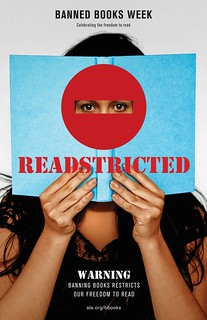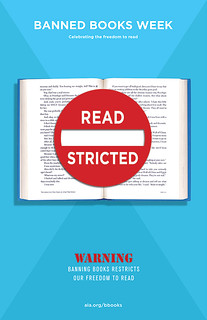You Can’t Read That! is a periodic post featuring banned book reviews and news roundups.
Hey, guess what? September 27 to October 3, 2015, is Banned Books Week in the USA!
 |
 |
YCRT! Red Alert
This week, high school students in Mayfield, Kentucky, were given a current events assignment: to read newspaper articles about police use of deadly force against minorities, and to write reports on the subject. After the Kentucky State Police learned of the assignment from the student child of an officer, it intervened directly with the school district to have the assignment cancelled. KSP’s reason? A state trooper had been killed by a black suspect during a traffic stop earlier this month.
“I just think with the state of mourning the community is in and law enforcement,” Nall said. ‘It’s just a bad time to have students reviewing and analyzing law enforcement deadly force issues with minorities.”
In past YCRT! posts, I’ve linked to, and commented on, several stories about political interference in school textbook selection and class content, most often in the form of attempts to censor textbooks and restrict discussion of hot-button topics like evolution, science, sex, and abortion. But up to now such campaigns have been conducted in public, with open hearings and school board reviews. In this case, it appears the Kentucky State Police contacted the school district directly, and the district ordered the assignment pulled. There was no review process, no opportunity for students or parents to participate in the decision.
No word on what will happen to the teacher who thought up the assignment, but it’s not hard to guess he or she will be looking for another gig soon.
p.s. Here’s my favorite Facebook comment on the story:

YCRT! News Roundup
In the spirit of Banned Books Week, the National Coalition Against Censorship presents five book banning stories from the field.
After an outcry from a Christian group, an award-winning young adult novel, Into the River, has become the first book in more than 20 years to be officially banned in New Zealand.
Remember how, in the wake of the 9/11 terror attacks, the ALA and a few courageous librarians stood firm against federal efforts to track the reading habits of library patrons? You do realize the feds haven’t stopped trying, right? The Department of Homeland Security recently ordered a New Hampshire public library to shut down its anonymous server, which made it impossible to track sites visited by library patrons.
“A few parental complaints can change the curriculum for everyone’s children, including older students. What literature will parents challenge in the future, knowing that they have the power to stop an entire school from studying a book?”
A mother from Knoxville, Tennessee, labels the New York Times bestseller The Immortal Life of Henrietta Lacks pornographic. The author responds, saying the complainant is confusing gynecology with pornography.
The left gets much of the blame for political correctness, but they’ve got nothing on the right, the true masters of obfuscating doublespeak.
Remember Peyton Place? Before Peyton Place, there was The Boy Came Back.
Author Judy Blume talks about her struggles with book banners.
Just for fun, here’s an interview with Dav Pilkey, author of the Captain Underpants series of children’s books, on what it’s like to hold down the top spot of every banned book list in the world.
Have a great Banned Books Week, everyone! I don’t know about you, but I’ll be ordering a copy of The Boy Came Back — it sounds like a fun read.